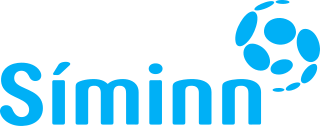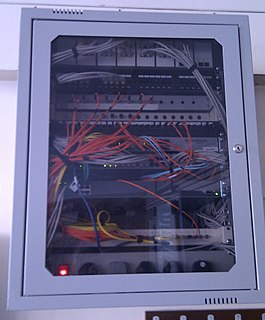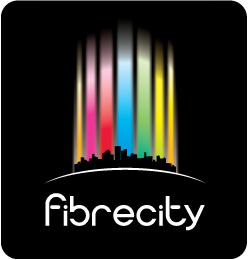Telecommunications in Ireland operate in a regulated competitive market that provides customers with a wide array of advanced digital services. This article explores Ireland's telecommunications infrastructure including: fixed and mobile networks, The voice, data and Internet services, cable television, developments in next generation networks and broadcast networks for radio and television.

A metropolitan area network (MAN) is a computer network that interconnects users with computer resources in a geographic region of the size of a metropolitan area. The term MAN is applied to the interconnection of local area networks (LANs) in a city into a single larger network which may then also offer efficient connection to a wide area network. The term is also used to describe the interconnection of several local area networks in a metropolitan area through the use of point-to-point connections between them.

A dark fibre or unlit fibre is an unused optical fibre, available for use in fibre-optic communication. Dark fibre may be leased from a network service provider.
Singtel Optus Pty Limited is an Australian telecommunications company headquartered in Macquarie Park, New South Wales, Australia. It is a wholly owned subsidiary of Singtel. Optus is the second-largest wireless carrier in Australia, with 10.5 million subscribers as of 2019.
PIPE Networks is an Australian telecommunications company, based in Brisbane, Queensland. It is a subsidiary of TPG Telecom. Its primary business is setting up peering exchanges. PIPE itself stands for "Public Internet Peering Exchange". The company also provides services such as co-location, telehousing, and fibre networks.
KCOM Group is a UK communications and IT services provider. Its headquarters are in the city of Kingston upon Hull, a unitary authority in the ceremonial county of the East Riding of Yorkshire, and it serves local residents and businesses with Internet and telephony services. It was listed on the London Stock Exchange but is now privately owned by Macquarie Group.
TransACT is the trading name of TransACT Capital Communications, an Australian telecommunications company based in Canberra which provides broadband internet access, fixed telephony, cable television services, and mobile phone services in Canberra and a subset of these services in Queanbeyan, throughout South-east New South Wales and in Victoria.

TelstraClear Limited was New Zealand's second-largest telecommunications company before being acquired by Vodafone New Zealand in October 2012.

Clear Communications was a telecommunications company based in New Zealand. Until merging into Telstra's operations in 2001, it was the biggest rival to Telecom New Zealand.

Be Unlimited was an Internet service provider in the United Kingdom between 2004 and 2014. Initially founded as an independent company by Boris Ivanovic and Dana Tobak in 2005, it was bought by Spanish group Telefónica Europe in 2006 before being sold on to BSkyB in March 2013 in an agreement which saw BSkyB buy the fixed telephone line and broadband business of Telefónica Europe which at the time traded under the O2 and BE brands. The deal saw BSkyB agree to pay £180 million initially, followed by a further £20 million after all customers had been transferred to Sky's existing business. The sale was subject to regulatory approval in April 2013, and was subsequently approved by the Office of Fair Trading on 16 May 2013.

Síminn hf., previously named Landssíminn, is an Icelandic telecommunications company. It offers communication services for both private and corporate clients, including mobile, home phones, Internet connections and television. Síminn also runs its own TV channel and streaming services. Síminn owns and operates companies in the information technology and infrastructure and is listed in the Icelandic stock exchange.

Fiber-optic communication is a method of transmitting information from one place to another by sending pulses of infrared light through an optical fiber. The light is a form of carrier wave that is modulated to carry information. Fiber is preferred over electrical cabling when high bandwidth, long distance, or immunity to electromagnetic interference is required. This type of communication can transmit voice, video, and telemetry through local area networks or across long distances.
Internet access is widely available in New Zealand, with 93% of New Zealanders having access to the internet as of January 2020. It first became accessible to university students in the country in 1989. As of June 2018, there are 1,867,000 broadband connections, of which 1,524,000 are residential and 361,000 are business or government.
PowerTel was an Australian telecommunications company that operated urban and inter-city fibre optic networks across Australia between 1998 and 2007.
This article lists the deployment of fiber to the premises, fiber to the home and fiber to the building by country.
Telecommunications in Guyana include radio, television, fixed and mobile telephones, and the Internet. Early telecommunications were owned by large foreign firms until the industry was nationalized in the 1970s. Government stifled criticism with a tight control of the media, and the infrastructure lagged behind other countries, Guyana Telephone and Telegraph Company (GT&T) holding a monopoly on most such services. In a 2012 census report on Guyanese households, 55.5% had a radio, 82.7% had a television, 27.8% had a personal computer, and 16.2% had internet at home, 49.3% had a telephone landline, and 70.6% had a cellular phone.
British Rail Telecommunications was created in 1992 by British Rail (BR). It was the largest private telecoms network in Britain, consisting of 17,000 route kilometres of fibre optic and copper cable which connected every major city and town in the country and provided links to continental Europe through the Channel Tunnel.

Fibrecity Holdings was formerly owned by i3 Group and was acquired in a Management buyout in January 2011 by CityFibre Holdings Ltd following the collapse of FibreCity's principal lender Total Asset Finance.
Telecommunications in Germany is highly developed. The German telecommunication market has been fully liberalized since January 1, 1998. Germany is served by an extensive system of automatic telephone exchanges connected by modern networks of fiber-optic cable, coaxial cable, microwave radio relay, and a domestic satellite system; cellular telephone service is widely available, expanding rapidly, and includes roaming service to foreign countries. As a result of intensive capital expenditures since reunification, the formerly antiquated system of the eastern part of the country has been rapidly modernized to the most advanced technology. Deutsche Telekom began rolling out FTTH networks in ten cities in 2011, following the launch of pilot projects in Hennigsdorf, Braunschweig and Dresden in 2010.
Wellington Electricity Lines Limited is an electricity distribution company, based in Wellington, New Zealand.







